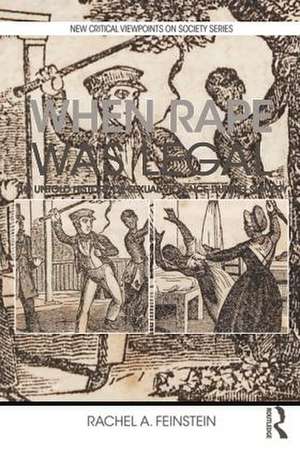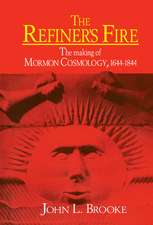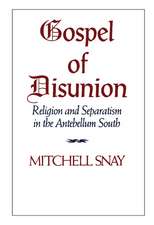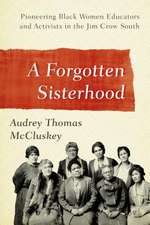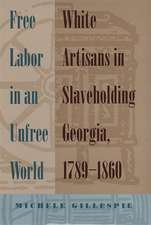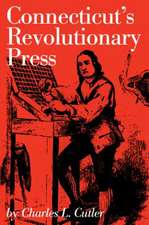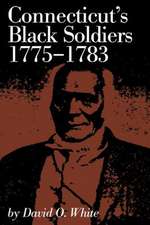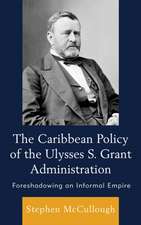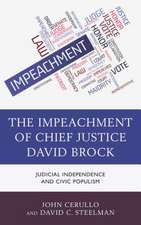When Rape was Legal: The Untold History of Sexual Violence during Slavery: New Critical Viewpoints on Society
Autor Rachel A. Feinsteinen Limba Engleză Paperback – 14 aug 2018
| Toate formatele și edițiile | Preț | Express |
|---|---|---|
| Paperback (1) | 356.45 lei 6-8 săpt. | |
| Taylor & Francis – 14 aug 2018 | 356.45 lei 6-8 săpt. | |
| Hardback (1) | 1000.27 lei 6-8 săpt. | |
| Taylor & Francis – 2 aug 2018 | 1000.27 lei 6-8 săpt. |
Din seria New Critical Viewpoints on Society
-
 Preț: 325.02 lei
Preț: 325.02 lei -
 Preț: 287.41 lei
Preț: 287.41 lei -
 Preț: 340.98 lei
Preț: 340.98 lei -
 Preț: 343.83 lei
Preț: 343.83 lei -
 Preț: 341.16 lei
Preț: 341.16 lei -
 Preț: 284.78 lei
Preț: 284.78 lei - 30%
 Preț: 1014.74 lei
Preț: 1014.74 lei -
 Preț: 304.26 lei
Preț: 304.26 lei -
 Preț: 340.17 lei
Preț: 340.17 lei -
 Preț: 352.59 lei
Preț: 352.59 lei -
 Preț: 341.74 lei
Preț: 341.74 lei -
 Preț: 385.54 lei
Preț: 385.54 lei - 16%
 Preț: 241.30 lei
Preț: 241.30 lei -
 Preț: 384.86 lei
Preț: 384.86 lei -
 Preț: 328.95 lei
Preț: 328.95 lei -
 Preț: 348.77 lei
Preț: 348.77 lei -
 Preț: 377.84 lei
Preț: 377.84 lei -
 Preț: 356.75 lei
Preț: 356.75 lei -
 Preț: 389.96 lei
Preț: 389.96 lei -
 Preț: 388.13 lei
Preț: 388.13 lei -
 Preț: 349.80 lei
Preț: 349.80 lei -
 Preț: 435.77 lei
Preț: 435.77 lei - 25%
 Preț: 994.58 lei
Preț: 994.58 lei -
 Preț: 347.91 lei
Preț: 347.91 lei -
 Preț: 369.73 lei
Preț: 369.73 lei -
 Preț: 323.23 lei
Preț: 323.23 lei -
 Preț: 377.84 lei
Preț: 377.84 lei
Preț: 356.45 lei
Nou
Puncte Express: 535
Preț estimativ în valută:
68.21€ • 71.07$ • 56.47£
68.21€ • 71.07$ • 56.47£
Carte tipărită la comandă
Livrare economică 03-17 aprilie
Preluare comenzi: 021 569.72.76
Specificații
ISBN-13: 9781138629684
ISBN-10: 1138629685
Pagini: 108
Dimensiuni: 152 x 229 x 12 mm
Greutate: 0.14 kg
Ediția:1
Editura: Taylor & Francis
Colecția Routledge
Seria New Critical Viewpoints on Society
Locul publicării:Oxford, United Kingdom
ISBN-10: 1138629685
Pagini: 108
Dimensiuni: 152 x 229 x 12 mm
Greutate: 0.14 kg
Ediția:1
Editura: Taylor & Francis
Colecția Routledge
Seria New Critical Viewpoints on Society
Locul publicării:Oxford, United Kingdom
Public țintă
General, Postgraduate, and UndergraduateCuprins
Chapter 1. Introduction Chapter 2. The Voices of Black Women & Black Men: Why Sexual Violence by White Men was Rampant during Slavery Chapter 3. White Masculinity and Sexual Violence against Enslaved Black Women Chapter 4. White Women’s Role in Sexual Violence of Enslaved Black Women Chapter 5. The Power of Language: White Women’s Divorce Petitions Chapter 6. Racialized & Gendered Sexual Violence Today
Notă biografică
Rachel A. Feinstein received her Ph.D. in Sociology from Texas A&M University in 2014. She has since worked as Assistant Professor of Sociology and Criminal Justice at Carthage College in Wisconsin, and is currently teaching in the Sociology Department at California State University, Fullerton. Her research, both contemporary and historical, combines Criminology, Race/Ethnicity and Gender Studies, and can be found in several sociology and criminology journals.
Recenzii
Dr. Feinstein in When Rape was Legal, combines the use of multiple archival sources with her theoretically informed and insightful analysis of the largely overlooked issue of the rape of enslaved black women by white men. She brings together systemic racism perspectives with scholarship on intersectionality to highlight how the privilege and power of whites was achieved through the sexual exploitation of black women. Dr. Feinsten uniquely adds to our understanding of this topic through bringing to the fore 1) the role of white women as ‘intermediate groups’ that reinforce oppression and 2) how the ‘intergenerational reproduction of white masculinity’ works. This book is essential reading for scholars and students in criminology, sociology, race and ethnic studies, and women’s and gender studies. The insights from her careful historical analysis add to our current understanding of violence against women, racial oppression and the perpetuation of privilege and inequality. It also adds to insights on the historical domination of black bodies, and in this case female black bodies, complementing Ta-Neishi Coates’ powerful insights in Between the World and Me.
Holly Foster, Professor of Sociology, Texas A&M University
Rachel Feinstein’s book is a must-read for scholars making connections between slavery, Jim Crow, and contemporary issues. Her use of original court records and diaries gives voice to otherwise silenced women, Black and White. She shows how the intergenerational transmission of white masculinity continues to contribute to sexual violence committed against women today.
Ruth Thompson-Miller, author, Jim Crow’s Legacy: The Lasting Impact of Segregation
Feinstein presents powerful and heart-wrenching narratives of commonplace and state-sanctioned sexual terrorism by white males against enslaved Black women. She details the intergenerational transmission of white masculinity, shows how gendered racism fits within the white racial frame, and, important for the current gap in literature it fills, chronicles white women’s complicity in white men’s rape of enslaved Black women. The narratives in When Rape Was Legal are painful to read, yet Feinstein’s analysis is critically important to understand sexual assault and gendered racism today.
Leslie Picca, Professor of Sociology, University of Dayton
Holly Foster, Professor of Sociology, Texas A&M University
Rachel Feinstein’s book is a must-read for scholars making connections between slavery, Jim Crow, and contemporary issues. Her use of original court records and diaries gives voice to otherwise silenced women, Black and White. She shows how the intergenerational transmission of white masculinity continues to contribute to sexual violence committed against women today.
Ruth Thompson-Miller, author, Jim Crow’s Legacy: The Lasting Impact of Segregation
Feinstein presents powerful and heart-wrenching narratives of commonplace and state-sanctioned sexual terrorism by white males against enslaved Black women. She details the intergenerational transmission of white masculinity, shows how gendered racism fits within the white racial frame, and, important for the current gap in literature it fills, chronicles white women’s complicity in white men’s rape of enslaved Black women. The narratives in When Rape Was Legal are painful to read, yet Feinstein’s analysis is critically important to understand sexual assault and gendered racism today.
Leslie Picca, Professor of Sociology, University of Dayton
Descriere
When Rape was Legal is the first book to solely focus on the widespread rape perpetrated against enslaved black women by white men in the United States. The routine practice of sexual violence against enslaved black women by white men, the motivations for this rape, and the legal context that enabled this violence are all explored and scrutinized. Enlightening analysis found that rape was not merely a result of sexual desire and opportunity, or simply a form of punishment and racial domination, but instead encompassed all of these dimensions as part of the identity of white masculinity. This provocative text highlights the significant role that white women played in enabling sexual violence against enslaved black women through a variety of responses and, at times, through their lack of response to the actions of the white men in their lives. Significantly, this book finds that sexual violence against enslaved black women was a widespread form of oppression used to perform white masculinity and reinforce an intersectional hierarchy. Additionally, white women played a vital role by enabling this sexual violence and perpetuating the subordination of themselves and those subordinate to them.
